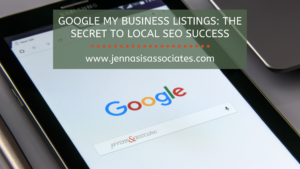While local SEO has always been an important business tactic to drive internet traffic, it’s become more important than ever to have a strong online presence in today’s pandemic climate.
Recent studies show just how dramatically consumer shopping habits have evolved over the past several months as social distancing has pushed more shoppers online to find what they need. And the shift isn’t temporary.
According to a global Salesforce Inc. study, 58 percent of consumers say they expect to do more online shopping after the pandemic than they did before it. Surveyed business buyers aligned similarly, with 80 percent reporting they expect to do more business purchasing online in the post-pandemic era than before.
You may think you have a strong online presence already. However it’s ultimately up to Google to determine if your presence will be seen by the millions of internet users every single day.
So—just how high are you really ranking with the juggernaut of search engines? And if you’re not satisfied with the answer, how do you get into Google’s good graces to climb higher in the ranks?
Read on for our local SEO agency’s guide to increasing your local SEO ranking. We’ve got 10 core tips to help you improve so that you can drive more organic traffic to your website.
What is local SEO?
First, you need to understand what local SEO is.
You’ve likely heard the term Search Engine Optimization—SEO for short. SEO encompasses your efforts to increase both the quantity and quality of traffic to your website through organic search engine results.
For many companies, this boils down most simply to the quest to snag that coveted No. 1 top spot in Google search results. While not the only search engine, Google is typically chief of focus as it boasts an average net market share of 70.38 percent on desktop and 93.87 percent on mobile.
When we refer to local SEO, we’re focused on SEO efforts designed to help your business rank higher in search results specifically for your local area. This is particularly important for businesses with a physical location, like a shop, to encourage foot traffic as well as web traffic.
However local SEO is important even during pandemic times when in-person visitors are down. You’re still targeting an audience that is located in the same geographical area as you are—and for many companies, these are more highly qualified leads.
10 Steps to Increase your Local SEO
So, how do you improve your local SEO efforts? We have 10 must-do tips for any organization looking to boost their community reach.
1. Google My Business Page
Creating a Google My Business page (GMB) listing for your business is one of the most important aspects of local marketing. A GMB page allows you to add your company name, phone number, address and photos to the search engine. Customers can also use your GMB page to leave reviews.
Having a properly set up GMB listing is critical because it is almost always the first thing your customer will see when searching for your services on Google. It also allows the platform to give your business a full, right-hand side panel of information—which is more visually robust when compared to the standard organic listing on a results page.
Pro Tip: Google My Business profiles now allow you to make daily, weekly, or monthly posts—allowing web visitors to learn about updates before they even hit your website.
2. Reviews
Once your GMB page is set up, encourage customers to leave online reviews. Google reviews are becoming more and more critical for businesses to have, not only because they help improve search rankings—but because they help consumers in their buying decisions.
In a day and age where people can use their smartphones to look up information quickly from the palm of their hand, consumers are increasingly relying on reviews to inform their purchasing decisions. In fact, 97 percent of consumers consult reviews before making a purchase, according to Business Wire.
Ensure your business is implementing a review strategy so that you can get customers to submit testimonials after they’ve engaged with your business. With proper schema markup (see tip No. 9!), you can have your review stars show up on your organic listings.
3. Optimize for mobile
Ensuring your website is mobile friendly has become a common practice within digital marketing. With more than 50 percent of global internet searchers coming from a mobile device, it’s increasingly important that your business pays attention to what your website looks like on devices of all sizes.
Mobile optimization plays a part in your overall organic rankings, as well. If your website is not mobile friendly, Google will penalize your website—significantly hurting your ranking in organic search.
Not sure if your website is mobile friendly? You can use this free mobile optimization test by Google to determine your mobile optimization score.
4. Optimize for voice search
The rise of mobile users has triggered a rise in voice search, with consumers taking advantage of tools like Siri, Alexa, and Google Voice Search to speak their search query aloud to their smartphone. Because voice search is becoming more common, your business must adapt its keyword and on-page optimization strategy accordingly to ensure you rank for voice search terms.
How are voice search terms different from text-based queries?
Searchers typing out their inquiries typically use as few words as possible to achieve their goal. However when speaking aloud, their queries tend to be longer. Questions often make use of “Who, What, Where, When, Why, How”, as well as other question modifiers and long-tail keywords that are conversational and capture intent, explains WordTracker.
Thus, your business should use conversational keywords to capture voice searchers, such as “How to upload an image.” An FAQ place is a great spot to house common conversational keywords—not only providing consumers with a helpful, comprehensive resource, but enabling you to rank when someone asks Siri where the closest business in your space is.
5. Citations
With hundreds of online directories being used, it’s important to make sure your business citation is correct and consistent across all directories such as Google, Yelp, Facebook, Yellowpages, Yahoo and Bing. Your citation encompasses your business name, address, and phone number—also referred to as your business NAP.
Over time, your business may change its phone number or move to a new location. These are common causes of citation variations across platforms, which can confuse both customers and Google.
While you can try to manually track all directories for accuracy, it can be a pretty intensive and tedious process. A local SEO partner can automate the process for you through monthly citation management.
6. Adding Location Pages
If your small business servers customers of specific geographic locations—i.e. Local SEO Agency in Cleveland—a great SEO hack is to create location pages dedicated to the service being offered in that specific region.
The key to creating high-quality location pages is to make sure the location is in the title and main headers of the page. You can even take it a step further by embedding a map and including your NAP (business name, address and phone number).
By including these details on your website, you are directly telling Google where your business is located and what services you offer. This makes it all the more likely for Google to list your page when someone types in a search query for that service within your geographic area.
7. Individual Service Pages
As mentioned above, pairing your service and/or product offering with a specific location can be a great way to let Google know where and what you are offering. But even if you do not have a physical location or geographic-specific customers, detailing each service and/or with their own individual page within your website is a great way to rank your business locally.
Why? If you rely on one page to list multiple products and/or services, it confuses Google as to what you are offering to the customer.
Google prides itself on matching searches with exactly what searchers are looking for. The easier you will make it for Google’s algorithm to index your website pages, the easier and faster they will rank for the best-fit terms.
The takeaway: Make sure each product/and or service page is listed separate within your website, and that each has a clear focus on what you are offering and the value it provides.
8. Location-Specific Keywords
While determining what keywords to rank for is always first in mind when it comes to any business’s SEO strategy, many overlook associating their location. For effective local marketing, you need to add the physical location to the end of your keyword.
Location-specific keywords not only inform Google of your product or service within its geographical context, but also help you better rank for voice search and keywords your customers are directly looking for.
To accomplish this effectively, put yourself in your customers’ shoes and think about the phrases you would type into Google. Perhaps you want to find the “best restaurant near me,” “closest tire store,” or a “doggy day care in Cleveland.”
Below are some more examples of effective location keywords:
- Digital Marketing Agency Cleveland
- Akron Coffee Shop
- Dentist in Lakewood Ohio
- Ohio Physical Therapist
9. Location Schema
If you haven’t heard of schema markup, don’t panic. It’s a newer marketing technique, however it’s becoming extremely important for ranking in local markets.
Schema markup is custom code that you input through the backend of your website to help search engines return more informative results for users. And while there are hundreds of schema options, local schema is one of the most popular and effective. You can input your exact coordinates, business information, services, and more.
Not only will this information enhance your Google rankings because Google now has extra information about your location, but it also gives your customers more information than they normally would. This often will naturally increase engagement.
10. Title Tag and Meta Description
In any SEO strategy, optimizing the title tags and meta descriptions of your web pages should be among the first efforts you undertake with your website. For those focused on a local marketing strategy, you’ll want to optimize with location-specific keywords.
When determining what title tag and meta descriptions need this local update, consider what key pages you want your customers to be visiting. Typically, your homepage and main services pages are a great place.
Then, remember tip No. 8! When optimizing, simply include your core keyword with your location within the title tag and meta description. (Note: you need to add the core keyword within first 5 words of the meta description).
Pro Tip: Whatever core location keyword you end up optimizing your title tag and meta description with, make sure to add that keyword to your H1 title on the page to get even more SEO value!
Planning Your Local SEO Strategy
If used consistently and correctly, these 10 core local SEO steps can dramatically increase your local rankings—driving more organic website traffic, and ultimately, more conversions.
If SEO is a bit too overwhelming for you or you simply don’t have the time to invest in a dedicated strategy, engage with a local SEO agency for assistance.
Jennasis & Associates’ local SEO experts can get you started with a comprehensive analysis of your website. From there, we can provide a strategic plan—along with the staff and resources to execute it—so you can see the results of rich local SEO efforts, without having to do any of the heavy lifting.
To get started with an SEO audit, or to inquire more about the potential impact local SEO can realize for your business, reach out to us at digitalmarketing@jennasisassociates.com.






